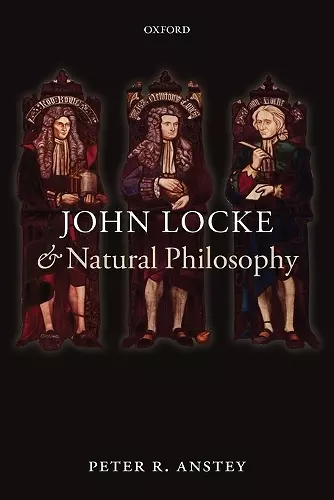John Locke and Natural Philosophy
Format:Paperback
Publisher:Oxford University Press
Published:4th Apr '13
Currently unavailable, currently targeted to be due back around 25th January 2025, but could change
This paperback is available in another edition too:
- Hardback£83.00(9780199589777)

Peter Anstey presents a thorough and innovative study of John Locke's views on the method and content of natural philosophy. Focusing on Locke's Essay concerning Human Understanding, but also drawing extensively from his other writings and manuscript remains, Anstey argues that Locke was an advocate of the Experimental Philosophy: the new approach to natural philosophy championed by Robert Boyle and the early Royal Society who were opposed to speculative philosophy. On the question of method, Anstey shows how Locke's pessimism about the prospects for a demonstrative science of nature led him, in the Essay, to promote Francis Bacon's method of natural history, and to downplay the value of hypotheses and analogical reasoning in science. But, according to Anstey, Locke never abandoned the ideal of a demonstrative natural philosophy, for he believed that if we could discover the primary qualities of the tiny corpuscles that constitute material bodies, we could then establish a kind of corpuscular metric that would allow us a genuine science of nature. It was only after the publication of the Essay, however, that Locke came to realize that Newton's Principia provided a model for the role of demonstrative reasoning in science based on principles established upon observation, and this led him to make significant revisions to his views in the 1690s. On the content of Locke's natural philosophy, it is argued that even though Locke adhered to the Experimental Philosophy, he was not averse to speculation about the corpuscular nature of matter. Anstey takes us into new terrain and new interpretations of Locke's thought in his explorations of his mercurialist transmutational chymistry, his theory of generation by seminal principles, and his conventionalism about species.
Anstey argues that Lockes views on natural philosophy have been poorly understood, that the distinction between natural and speculative philosophy is central to understanding Lockes project, and that laws of nature play only a small role in his theory . . . This excellent book is crucial reading for anyone interested in the development of the scientific method. * 07/03/13 *
an excellent book on Locke and natural philosophy. [Anstey] integrates deep archival research and a broad knowledge of the time and place with good judgment and sharp insight. His accounts of Locke's relations to Bacon and Boyle, of Locke's interests in biology, medicine, and chemistry, and of Locke's views on natural history and hypotheses are the fullest and best that I know. * Michael Jacovides, Metascience *
It will be an uncommon philosopher who has nothing to learn from this masterly reappraisal of Locke's positions in natural philosophy and the philosophy of science ... The wealth of material he presents enables Anstey to build a convincing portrait in depth, all the more convincing because the figure that emerges, complex, multi-talented, and at the centre of things, enables us to understand Locke's standing among his contemporaries, even those for whom philosophy as we know it ranked low among their preoccupations ... a mighty achievement. * Keith Campbell, Metascience *
Every reader of Peter Anstey's John Locke and Natural Philosophy will be struck by how much the author knows about Locke's engagement with natural philosophy. * Matthew Stuart, Metascience *
Locke's work on natural philosophy has been the subject of an increasing amount of attention in recent years, but [this] is the first book to have been devoted entirely to this area of his thought. . . . As this book amply demonstrates, Peter Anstey has a first-rate command of this material . . . The term "Locke scholar" has often been used for writers in whom few traces of scholarship are discernible, but in Anstey's case the term is, for once, entirely appropriate . . . John Locke and Natural Philosophy is an important contribution to Locke studies, and one that ought to be read by anyone with a serious interest in Locke's thought. Many books on Locke can safely be neglected: this is emphatically not one of them. * J. R. Milton, Intellectual History Review *
- Winner of WINNER OF THE ^IJOURNAL OF THE HISTORY OF PHILOSOPHY^R PRIZE FOR BEST BOOK PUBLISHED ON THE HISTORY OF WESTERN PHILOSOPHY, 2011.
ISBN: 9780199679522
Dimensions: 235mm x 157mm x 15mm
Weight: 388g
272 pages